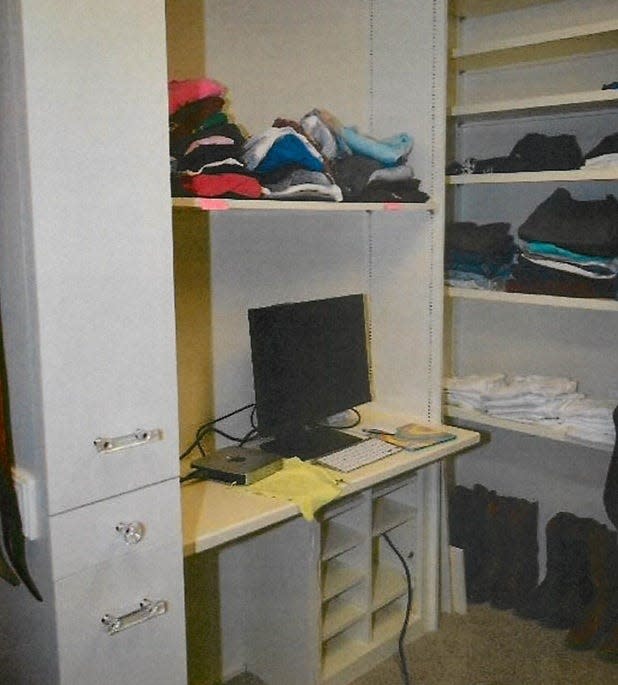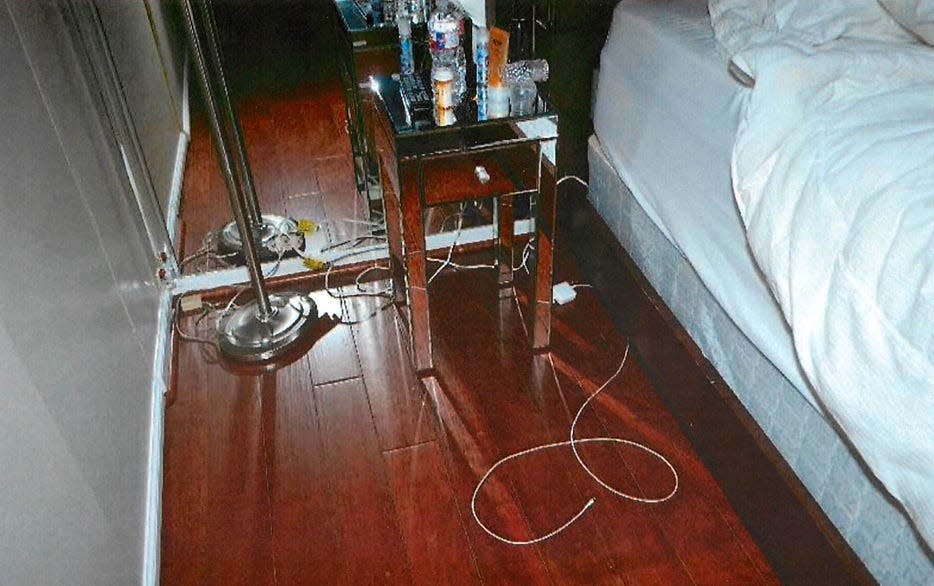James Staley's lawyer lays out case to overturn his capital murder conviction
The man convicted of murdering 2-year-old Jason Wilder McDaniel claims searches of his digital devices were unconstitutional, and a Wichita Falls police search warrant was shoddily written and invalid, according to a brief filed by his appeals attorney.
James Irven Staley III’s cell phone, laptop and Mac Mini computer — all seized through the search warrant — yielded electronic gold for prosecutors. They mined disturbing messages and videos from them to put before Fort Worth jurors who found Staley guilty March 13 of capital murder of a person under 10.
His new attorney contends this key evidence was inadmissible, and the appeals court should reverse the conviction of the once prosperous oilman serving a life sentence without parole and order a new trial for him.
Prosecutors say Staley smothered Wilder with a pillow in a crib Oct. 11, 2018. Then he staged the child’s body on the floor to make it look as if Wilder died as a result of a fall in Staley’s Country Club area home in Wichita Falls.

'Bare bones' affidavit for search warrant
Appeals attorney Keith S. Hampton dropped a brief Nov. 2 on the Second Court of Appeals in Fort Worth. It details the case to overturn Staley’s conviction — a case turning on an affidavit written to persuade a judge to issue a search warrant for Staley’s home in the 200 block of Irving Place.
Wichita Falls police detective Raymond Perry, now retired from the force, created a “bare bones” affidavit to obtain the search warrant, Hampton said in the brief.
Then police searched the house in the 200 block of Irving Place on Oct. 22, 2018, and seized digital devices from Staley.
An expert with the North Texas Regional Computer Forensics Laboratory found both the “slapping” video made on a GoPro and the “quite the shiner” video on the Mac Mini, according to Hampton’s brief.

The infamous slapping video shows Staley striking the sleeping child, who wakes up screaming. Viewing it horrified jurors and observers during the trial. The other video shows Staley holding Wilder, who has a bruised head.
A forensics expert found a software program had been installed on the laptop Oct. 14, 2018, a few days after Wilder’s death, according to Hampton’s brief. The CCleaner program can wipe deleted files from a hard disk so they never be recovered, and it's also used to perform general computer maintenance.
Appeals attorney: Trial judge's mistake
Wichita Falls police detective Tanner Fowler looked over the contents of Staley’s cell phone, seized through the warrant, and saw texts and edited versions of the “quite the shiner” video found on the Mac Mini.
Staley’s trial lawyers sought to keep this evidence from going before the jury in the months before the trial. The prosecution, however, wanted it to be introduced to jurors. Senior District Judge Everett Young, who presided over the murder case, denied defense requests to suppress the evidence Jan. 13.

Hampton holds that Young should have ruled to exclude the evidence gleaned from searches of Staley’s cell phone and computers.
The appeals attorney brushed aside the prosecution’s earlier arguments to allow the videos and other digital evidence in as “creative speculations.”
Hampton: A cut and paste job
In any case, when Perry wrote the Oct. 22, 2018, search warrant, he did not specify any particular computer, laptop or cell phone, according to the appeals brief. He also didn’t lay out probable cause that a specific computer or cellphone would have evidence linked to Wilder’s homicide.
Hampton said in the brief that the affidavit’s “stock boilerplate” language didn't meet the Fourth Amendment’s demands. It is supposed to be specific about how particular items proposed for search are connected to allegations so a judge can determine probable cause.
The language in the affidavit looks as if the detective cut and pasted it from other affidavits for searches of digital devices belonging to child pornography suspects, according to the at-times scornful brief.

What’s more, the affidavit for the search warrant was so broadly written it enabled police to overreach.
“The warrant in this case was a license for police to forage all of Appellant’s unidentified electronic devices,” Hampton said in the brief.
'Fruits of the poisonous tree'
What's more, the judge who signed off on the search warrant had no basis to conclude there was probable cause to search Staley’s cell phone and computers, according to Hampton.
Now retired, former 78th District Judge Barney Fudge signed the search warrant and the affidavit for it. Both of the documents are filed with the appeals attorneys' brief.
![Appeals attorney Keith Hampton answers questions Nov. 6, 2019, from reporters at the Williamson County Justice Center about Greg Kelley's exoneration. Kelley was accused in 2013 of sexually assaulting two 4-year-old boys at an in-home daycare site operated by a friend's family in Cedar Park. [RICARDO B. BRAZZIELL/AMERICAN-STATESMAN]](https://s.yimg.com/ny/api/res/1.2/pmoaMex8loB83oL1XZ53lg--/YXBwaWQ9aGlnaGxhbmRlcjt3PTk2MDtoPTY0MA--/https://media.zenfs.com/en/times-record-news/25143b6a1a4e08898b8fa37dab64c01d)
Hampton contends the affidavit for the search warrant was unconstitutional and didn’t follow Texas law on criminal procedure, and the detective who wrote it failed to meet requirements for a phone search other than stating his name.
Hampton said in the brief the two videos, installation of CCleaner software and texts from Staley’s phone “are fruits of the poisonous tree” and so inadmissible in court under the Fourth Amendment.
'Devices rummaged by police'
He has requested to present an oral argument before the appeals court. The prosecution has a Dec. 4 deadline to file a brief in response.
Hampton also filed “photographs of the devices rummaged by police” with his brief. They showed the Mac Mini in an office in a closet in Staley’s home, a cell phone on a bed and a cabinet with shelves containing various devices.

Wilder’s mother, Amber Nichole McDaniel, and Staley had a short, tumultuous relationship that ended with the child’s death. She and Robert “Bubba” McDaniel Jr., the child’s father, married after Wilder was killed and the couple had another son.
Amber gave extensive testimony against Staley during his trial at the Tim Curry Criminal Justice Center in Fort Worth.
In September, she was sentenced to two years in state jail for endangering Wilder by allowing him to be around Staley. She was also sentenced to five years of probation for tampering with evidence by deleting electronic messages between herself and her former boyfriend from her cell phone.
More: Two accused of plotting a man's murder
Trish Choate, enterprise watchdog reporter for the Times Record News, covers education, courts, breaking news and more. Contact Trish with news tips at tchoate@gannett.com. Read her recent work here. Her X handle is @Trishapedia.
This article originally appeared on Wichita Falls Times Record News: James Staley's appeals attorney details grounds to overturn conviction

